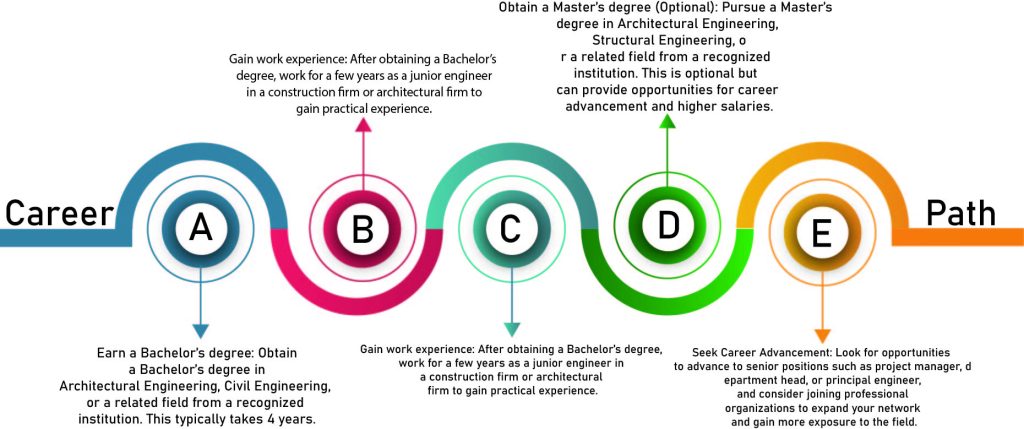Architectural engineering is a discipline that focuses on the design, planning, and construction of buildings and other structures. It combines principles of engineering, architecture, and construction management to ensure that buildings are functional, safe, and sustainable. Architectural engineers may work on various aspects of a building, such as HVAC systems, lighting, structural design, and acoustics. They work closely with architects, builders, and other professionals to ensure that a building meets its intended purpose and complies with relevant regulations and standards.

Work description
The work of an architectural engineer typically involves collaborating with architects, builders, and other professionals to design and construct buildings and other structures. They may be involved in various stages of a project, from initial design and planning to final construction and testing.
Specifically, an architectural engineer may be responsible for analyzing and interpreting building codes and regulations to ensure compliance, conducting site investigations to assess building site conditions, developing construction plans and specifications, conducting structural analysis to determine load-bearing capacity and stability of buildings, designing HVAC, plumbing, electrical, and other building systems, performing energy efficiency calculations and recommending sustainable design solutions, and collaborating with architects and other professionals to ensure that the design and construction of a building meet the client’s needs and expectations.
High Demand
The ability to contribute to the design and construction of structures that improve people’s lives and communities.
Lucrative salaries
The opportunity to work on a wide variety of projects, from small renovations to large-scale commercial or industrial buildings.
Opportunities for innovation
A diverse range of career paths within the field, including roles in design, project management, and construction.
Versatility
Competitive salaries and strong job prospects, with the Bureau of Labor Statistics projecting faster-than-average job growth for civil engineers (a related field) over the next decade.
Flexibility
The chance to work with other professionals in collaborative, team-based environments.
Job satisfaction
The potential to specialize in areas such as sustainable design, structural engineering, or building systems design.
High stress
The potential for high levels of stress and pressure, particularly in roles that involve managing complex projects or tight deadlines.
Long hours
The need for strong technical skills and knowledge, which may require significant education and training.
Competitive field
The potential for work to be physically demanding, particularly for those involved in on-site construction activities.
Constant learning
The risk of working in hazardous environments, such as construction sites or buildings with structural issues.
Isolation
The need to stay up-to-date with evolving technologies and industry trends, which may require ongoing education and training.
Eye strain and other physical health issues
The potential for competition for jobs, particularly in areas with high demand for architectural engineering services.
The cost of pursuing a career in architectural engineering in India can vary depending on various factors such as the institution you choose, the type of degree you pursue, the duration of the program, and other associated costs such as living expenses, transportation, and materials.
However, here are some approximate estimates of the costs involved:
A bachelor’s degree in architectural engineering can cost anywhere from INR 50,000 to INR 5 lakhs per year, depending on the institution and course.
A master’s degree in architectural engineering can cost anywhere from INR 1 lakh to INR 10 lakhs per year, depending on the institution and course.
Other associated costs such as living expenses, transportation, and materials can add an additional INR 1 lakh to INR 3 lakhs per year, depending on where you study and how you choose to live.
Overall, the cost of pursuing a career in architectural engineering in India can vary widely depending on various factors, but it is generally in line with the costs of pursuing other types of higher education.
[wpcharts type=”horizontalbarchart” bgcolor=”red:gray:yellow,blue:gray:yellow,random:gray:yellow,purple:gray:yellow” min=”0″ legend=”true” titles=”2 year , 5 year” values=”3,7,5,12″]
The earning potential of an architectural engineer in India can vary widely depending on various factors such as education, experience, location, and type of employer.
However, here are some approximate estimates of the earning potential:
The starting salary for an entry-level architectural engineer in India can range from INR 2 lakhs to INR 5 lakhs per year, depending on the employer and location.
The average salary for an experienced architectural engineer in India can range from INR 6 lakhs to INR 15 lakhs per year, depending on the employer and location.
Senior architectural engineers with significant experience and expertise can earn salaries in excess of INR 20 lakhs per year.
Overall, the earning potential of an architectural engineer in India can be quite competitive, with opportunities for advancement and salary growth over time.
[wpcharts type=”horizontalbarchart” bgcolor=”red:gray:yellow,blue:gray:yellow,random:gray:yellow,purple:gray:yellow” min=”0″ legend=”false” titles=”Entry-Level, Mid-Career, Senior-Level ” values=”5,15,25,35,45,55″]
Strong problem-solving skills to come up with creative and practical solutions to design and engineering challenges.
Attention to detail to ensure that designs are accurate, safe, and comply with relevant building codes and regulations.
Good communication skills to work effectively with clients, architects, contractors, and other stakeholders involved in the design and construction process.
Strong analytical skills to evaluate complex data, perform calculations, and make informed decisions.
Good time-management skills to meet project deadlines and manage multiple tasks simultaneously.
Good visualization skills to create and interpret 2D and 3D drawings, models, and renderings.
Ability to work well in a team environment, collaborate with others, and provide leadership when necessary.
Poor time-management skills, which can lead to missed deadlines and compromised work quality.
Inadequate technical skills or knowledge, which can result in errors or unsafe designs.
Poor communication skills, which can lead to misunderstandings and conflict with colleagues or clients.
A lack of creativity or imagination, which can limit the ability to come up with innovative and practical design solutions.
An inability to work well in a team environment, which can limit collaboration and hinder project success.
An inability to handle stress and pressure, which can be high in roles that involve managing complex projects or tight deadlines.
A lack of attention to detail, which can lead to errors and safety issues in designs.
Work-life balance
The work-life balance of an architectural engineer can vary widely depending on the employer, location, and specific job responsibilities.
Architectural engineers typically work full-time, with a typical workweek of 40 hours. However, overtime may be required, especially when projects are approaching deadlines or require additional attention.
Some employers offer flexible work arrangements, such as flexible hours or telecommuting, to help employees balance work and personal commitments. However, this varies from employer to employer.
Depending on the project location and scope, architectural engineers may need to travel to job sites or client meetings. This can impact work-life balance, especially if travel is frequent or requires long periods away from home.
Architectural engineering can be a high-stress profession, with demanding clients, tight deadlines, and complex projects to manage. This can make it challenging to maintain a healthy work-life balance.
Despite the demands of the job, it is important for architectural engineers to prioritize personal time outside of work to maintain a healthy work-life balance.

Architectural engineering plays a crucial role in designing and constructing buildings that improve the quality of life for people.
Architectural engineers can contribute to environmental sustainability by designing energy-efficient buildings, reducing carbon footprint, and incorporating sustainable design principles into their work.
Architectural engineers can contribute to community development by designing buildings and infrastructure that serve the needs of the community.
Architectural engineering can contribute to economic development by creating job opportunities and supporting local businesses.
Architectural engineering can help preserve cultural heritage by designing buildings that reflect the local culture and history.
Architectural engineers can contribute to disaster resilience by designing buildings and infrastructure that are resilient to natural disasters such as earthquakes, floods, and hurricanes.
Structural Engineering
Design and analyze the structural systems of buildings to ensure they can withstand various loads and forces, such as gravity, wind, and earthquakes.
Building Systems Engineering
Design and develop building systems, such as heating, ventilation, and air conditioning (HVAC), electrical, plumbing, and fire protection systems.
Building Science
Conduct research and develop solutions to improve building performance in areas such as energy efficiency, indoor air quality, and acoustics.
Construction Engineering and Management
Plan and manage construction projects, including scheduling, cost estimation, and project coordination.
Sustainability and Green Building
Design and develop sustainable and environmentally friendly buildings that reduce energy consumption, minimize waste, and use renewable resources.
Conclusion:
In conclusion, architectural engineering is an exciting and dynamic career with many opportunities for growth and impact. With the increasing demand for sustainable and energy-efficient buildings, there is a growing need for skilled architectural engineers. Pursuing a career in this field can be rewarding for those who are passionate about design, problem-solving, and improving the built environment.



